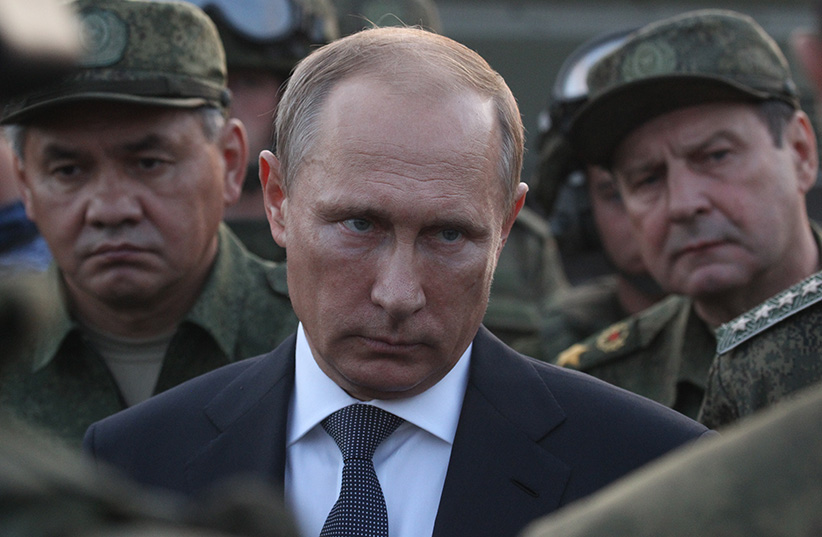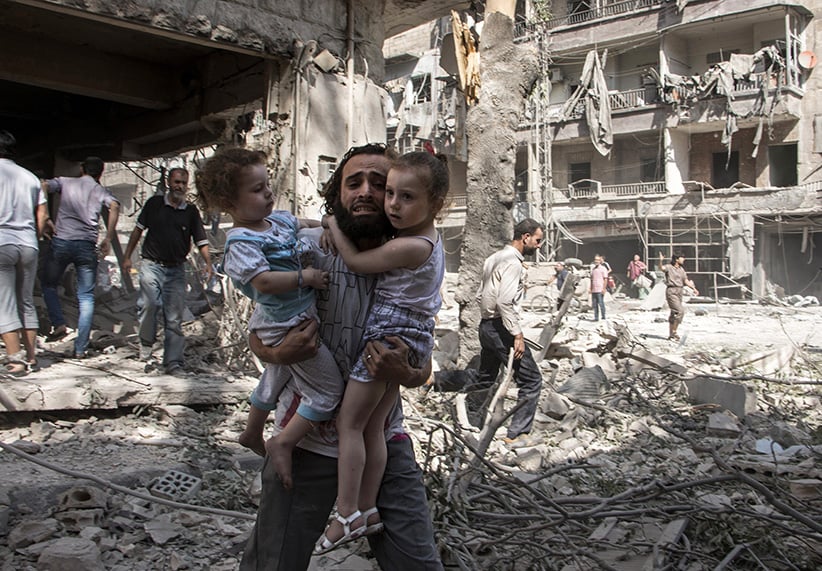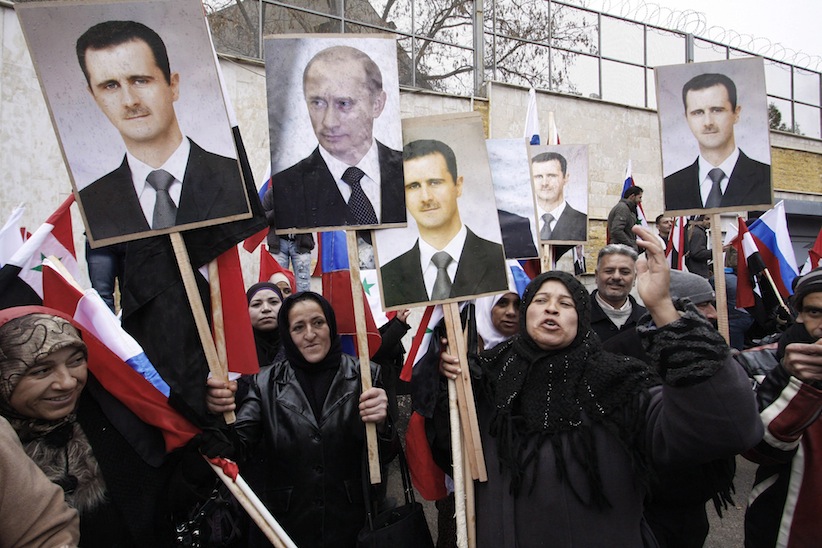Vladimir Putin’s new world order in the Middle East
By entering the Syrian civil war, Russia is asserting itself as a new power in the Middle East—at America’s expense. And everything will be worse for it.
ORENBURG, RUSSIA- SEPTEMBER 19: Russian President Vladimir Putin talks to officers as he attends Russias large-scale Center-2015 military exercises at Donguzsky Range September 19, 2015 in Orenburg, Russia, The exercises, aim to contain the outbreak of an armed conflict in Central Asia. Putin said this week that it’s impossible to defeat Islamic State group without support of the government of Syria and that Moscow has provided military assistance to President Bashar al-Assad’s regime and will continue to do so. (Sasha Mordovets/Getty Images)
Share

The civil war in Syria raged for more than four years and killed more than 250,000 people without an outside power dropping a bomb anywhere near soldiers loyal to dictator Bashar al-Assad, whose forces are responsible for the vast majority of civilian deaths in the conflict.
Then Russia joined the war. Its air strikes, which began last Wednesday, did not hit Assad’s forces, of course. The Russians, with their fighter jets and attack helicopters, are in Syria at Assad’s invitation, operating out of an air base in territory he controls. But they did target positions close to the front line between regime- and rebel-controlled areas.
The intended target, according to Russia, was the so-called Islamic State, a jihadist group also known as ISIS, which a U.S.-led coalition that includes Canada is also bombing—as well as “other terrorist groups.” In fact, most of Russia’s bombs have hit areas with little or no Islamic State presence. The victims include a variety of opposition groups, including, according to U.S. Sen. John McCain and others, American-backed groups that have been armed and trained by the CIA.
“Even though the Russians are framing it as a fight against ISIS, if you look at their targeting, it’s really a fight against rebels that directly threaten Assad and his coastal stronghold,” says William McCants, a fellow at the Brookings Institution and author of The ISIS Apocalypse: The History, Strategy, and Doomsday Vision of the Islamic State. “[Russian President Vladimir Putin] has adopted the Assad regime’s framework of terrorism, which is anyone who is attempting to overthrow the regime.”
The Russians, in other words, are not in Syria to fight terrorism—at least, not primarily—but to fight for Assad.
Related: There’s nothing hopeful about Russia’s military aid for Syria
Moscow has put its military might behind a dictator that U.S. President Barack Obama said four years ago must step down, whose opponents America arms and funds, and whom thousands of Syrians have died trying to overthrow. By so doing, Putin has taken advantage of years of relative American inaction in Syria. He has moved to protect Russian assets in Syria, including a naval base he would likely lose if Assad were to fall. And he’s shown Russia to be a reliable ally where America is not, thereby spreading and deepening Russia’s influence in the region at Washington’s expense.
It is—at least at first blush—something of a coup for Moscow. Fresh on the heels of Russia’s successful invasion, then annexation, of the Ukrainian region of Crimea, which was accomplished in the face of Western protest and sanctions, Russia has now undercut Western power and relevance in the Middle East.
What Russia has not done, despite its professed desire for peace in Syria, is improve the chances of a settlement to end the war that most Syrians will accept. Nor is Russia helping the cause that has ostensibly brought it to Syria in the first place: the fight against terrorism. Few Syrians other than those loyal to Assad will benefit from Russia’s military intervention. The jihadists of Islamic State just might.
Whatever faults he may have, Bashar al-Assad is not stupid. He is, in fact, a supremely crafty survivor. The Arab Spring revolutions of 2010 and 2011 swept from office his fellow strongmen in Tunisia, Egypt and Libya. Assad’s chances of survival then, as the uprising against him morphed into civil war, did not look good—which is probably why Obama said the time had come for him to step aside, without having a strategy to make that happen.
So Assad gambled on portraying his regime as the lesser evil among the warring parties in Syria. “Assad and his intelligence apparatus have consistently facilitated the rise of jihadists,” writes Charles Lister, a visiting fellow at the Brookings Institution’s Doha Center, in a recent essay. “By releasing dozens of al-Qaeda prisoners in mid-2011, Assad helped give birth to a thriving Islamist insurgency . . . By then adopting a deliberate policy of not targeting [Islamic State], Assad directly facilitated that group’s recovery and explosion into the transnational ‘caliphate’ movement it claims to be today.”
This manipulation of jihadism by Assad’s regime has been well-documented—including by authors Michael Weiss and Hassan Hassan in their recent biography of Islamic State, ISIS: Inside the Army of Terror. McCants calls Assad “both arsonist and fireman” in the Syrian conflict. He fuelled the rise of Islamic State and presents himself as the only force that can stop it.
Four years later, it appears Assad’s bald cynicism has worked. Washington still says Assad has to go, but it isn’t that fussy about when. Assad’s removal “doesn’t have to be on Day 1 or Month 1 or whatever,” Secretary of State John Kerry said last month. He might as well have sent the Russian air force an invitation.

Russia’s primary and immediate goal is the survival of the Assad regime. Assad’s forces have recently been losing ground to various rebel groups in northern and western Syria, far from Islamic State’s stronghold in the northeast. Reuters last week reported that Iran, a longtime Syrian ally, was sending hundreds of additional troops to Syria to aid fighters from the Lebanese Shia militia Hezbollah and Syrian government forces in a planned offensive, backed by Russia.
Inserting Russian planes into Syrian air space also limits some of the military options that outside opponents of Assad might have considered. Turkey, for example, has long called for no-fly zones and protected safe havens in Syria. “Russian presence on the ground is an immediate deterrent to that, which stiffens morale on the regime side, saying, ‘We’re not going to let these external powers escalate their intervention,’ ” says Yezid Sayigh, a senior associate at the Carnegie Endowment for International Peace’s Middle East Center.
A second Russian goal is to assert Russia’s status as a force that must be reckoned with in the Middle East. Russia has made much of its recent intelligence-sharing deal with Syria, Iran and Iraq in the fight against Islamic State. In practice, because of its shortage of assets in the region, Russia doesn’t have that much intelligence on the group to share, but the symbolism—especially Russia’s partnership with Iraq, where America invested so much blood and treasure—is striking.
In Syria, Russia is working to ensure it will have a say in the country’s future. “They are signalling to the international community that nothing could be handled in Syria without them right now,” says Nikolay Kozhanov, a fellow in the Russia and Eurasia Program at Chatham House.
There may also be domestic political factors at play. Putin regularly appeals to Russians’ nationalism, which can be heightened when the country is at war. But the tactic involves risks.This is Russia’s first combat mission outside the former Soviet Union since the end of the Cold War. “The Russian people remember Afghanistan,” says Paul Stronski, a senior associate in the Russia and Eurasia Program at the Carnegie Endowment for International Peace. “They remember Chechnya. They remember previous forays into the Muslim world, and how deadly they were for Russian soldiers. So I don’t think there’s a whole lot of appetite inside Russia to get involved in another war in the Muslim world right now.”
Official Russian combat in Syria is limited to air strikes. But on Monday, a Kremlin official reportedly predicted that Russian military veterans may soon volunteer to fight in Syria—raising the possibility that Moscow may be considering waging a covert ground war in Syria similar to the one it conducted in Ukraine.

Finally, and perhaps most important, from Moscow’s perspective, Putin believes Russia is engaged in a larger geostrategic struggle against the United States and its allies. America has called for Assad’s departure. Its desultory attempts to make that happen haven’t worked. By going to war for Assad, and by calling for a new international coalition against Islamic State that includes the Syrian dictator, Putin is publicly rubbing Obama’s nose in his own failures, and is presenting Russia as an alternative guarantor of world order.
“What Putin is doing in Syria is he’s testing the West,” says Anna Borshchevskaya, a fellow at the Washington Institute for Near East Policy. “It’s a classic Kremlin approach. He did the same thing in Ukraine. He takes steps and he wants to see what’s the response.”
That response so far has been mild. Last Friday, after it became clear Russia was hitting rebel groups other than Islamic State, America, along with France, Britain, Germany, Turkey, Qatar and Saudi Arabia, issued a statement expressing “deep concern” and calling on Russia to bomb the jihadist group instead. Russian violation of Turkish air space last weekend also drew an official protest from NATO, of which Turkey is a member.
Friday’s statement from the U.S. and some of its allies predicted Russia’s intervention will fuel more radicalism and extremism. This is undoubtedly correct. “One of the major recruitment tools in that part of the world for Islamic State is the brutal way in which the Syrian government, the Assad regime, has treated its citizens,” says Angela Stent, director of the Center for Eurasian, Russian and East European Studies at Georgetown University. “Shoring Assad up, it’s very hard to see how that contributes toward stability in the Middle East.”
Any effort to confront Islamic State that includes Assad is similarly likely to be rejected by most Syrians. This is why Russia’s declared goal of working toward a political settlement that involves Syria’s “healthy opposition” is disingenuous. Even if Russia were able to construct an agreement on paper that leaves Assad in power for a “transition period,” many rebels groups will continue to fight.
Related: In the fight against ISIS, friends become each other’s enemies
A more robust response from the West to Russia’s air strikes might include more substantial military assistance to rebels opposing Assad. Even aid on a scale too modest to affect the overall course of the war could at least protect Syrians from some of Assad’s more egregious rampages, such as his air force’s habit of dropping crude “barrel bombs” on civilian neighbourhoods. “It’s pretty shameful that there have not been more active efforts to stop indiscriminate bombing of civilians,” says Sayigh.
He says training just two squads of rebels, and arming them with a limited number of anti-aircraft missiles would have had a sizable deterrent effect. “Shooting down a few aircraft conducting highly illegitimate bombing runs on civilian populations would have been a very legitimate thing to do,” he says. “There’s always the potential for escalation. But by withholding from any form of escalation for the last three years, all that’s happened is we end up now with Russian troops on the ground, because they’re correctly reading this reluctance as giving them an open field.”
More substantial actions are probably off the table. Marc Pierini, a former European Union ambassador to Syria and now a visiting scholar at Carnegie Europe, describes the establishment of protected safe zones as “a good idea of yesterday.” It would always have been difficult. Now, “the idea is dead.”
America, to some extent, tied its own hands when it failed to enforce its own “red line” and didn’t respond with force to a Syrian-government chemical-weapons attack that killed hundreds of civilians in 2013. If gassing children to death isn’t enough to trigger American military action against Assad, what would?
Related: Is there room in the skies for Canada’s air strikes?
The U.S. and its allies will likely instead continue to focus military efforts against Islamic State, while Assad batters much of the rest of Syria, now with Moscow’s assistance. “I think all of the options that were viable have disappeared,” says McCants, speaking of what Assad’s opponents outside Syria might have done to force his departure.
Assad’s exit now seems as far away as it has at any point since the uprising against him began. But those committed to his defeat inside Syria remain numerous; Assad is not on the cusp of victory, either.
One possible outcome, says McCants, is military stalemate, followed, eventually, by negotiations that lead to the federation of Syria or perhaps its breakup. The chances of Syria emerging from this war unified, at peace, and led by a more decent government than Assad’s, are slipping away.
“I see this as the final endgame in Syria,” says McCants. “It seems to me that we are seeing the final consequences of American inaction over the last few years.”